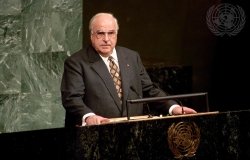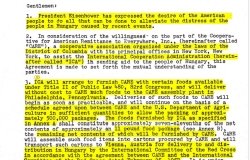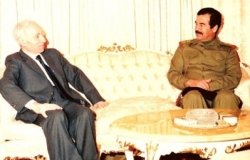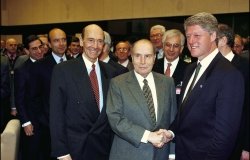
A blog of the History and Public Policy Program
Beyond “Dog Wagging the Tail” and “Tail Wagging the Dog”: Vietnamese Foreign Relations and the Cold War Endgame in Asia as Reflected in Trần Quang Cơ’s Memoir
Tran Quang Co's memoir complicates the existing analysis of the driving forces of both Vietnamese foreign relations and the Cold War endgame in Asia, writes Qingfei Yin.
The memoir of Trần Quang Cơ (1927-2015), former member of the Central Committee of the Communist Party of Vietnam (CPV) and First Deputy Minister of Foreign Affairs of the Socialist Republic of Vietnam (SRV), brings to light the intense diplomacy among great powers and regional players over the continued conflicts in Indochina after the unification of Vietnam as well as the bitter disagreements within the Vietnamese leadership over the country’s political priorities during the period of 1975-1993.
Trần Quang Cơ put together his memories and thoughts on “many sensitive developments” in Vietnamese foreign relations that he believed had been “intentionally or unintentionally” forgotten (rơi rụng) in the state-endorsed history “to ‘smooth over’ (tròn trĩnh) the historical record.”[i] Completed in Vietnamese in 2001 (updated in 2003) and informally circulated on the internet, the memoir has been used in two important recent works on the history of the Third Indochina War—Kosal Path’s Vietnam's Strategic Thinking During the Third Indochina War and Vu Minh Hoang’s “The Third Indochina War and the Making of Present-Day Southeast Asia,” in which the authors meticulously triangulate the source against the limitedly declassified Vietnamese archival documents.[ii]
Merle Pribbenow’s excellent translation, now available on the Wilson Center Digital Archive, makes this valuable historical source available to wider audiences.
Trần Quang Cơ’s account complicates the existing analysis of the driving forces of both Vietnamese foreign relations and the Cold War endgame in Asia. In the rich body of Vietnam War literature, the Vietnamese Communists are depicted either as ideological fighters of a “proxy war” fueled by military aid from the socialist bloc to confront the West-backed Republic of Vietnam or as cunning nationalists who achieved national unification against the formidable American intervention by manipulating and exploiting the competition between Beijing and Moscow.
From the late-1970s to the end of the Cold War, however, Hanoi quickly lost its room for strategic maneuver and was trapped in a seemingly unwinnable “four-level game,” where advances at one level likely jeopardized the goals at another: 1) to maintain bargaining power against China, the U.S., and the Soviet Union during the bilateral and trilateral détente among the latter three, 2) to reduce ASEAN’s hostility against Vietnam in service to Đổi Mới, 3) to defend the political and military status quo in Cambodia after the toppling of the murderous Khmer Rouge rule and to fight off challenges to Vietnamese status as the dominant power in Indochina, 4) and to take a coherent foreign stance by reconciling the differences between the party leadership and veteran diplomats.
With the search for a political solution to the Cambodian crisis featuring at the center of regional diplomacy, the memoir demonstrates that the end of “regional Cold Wars” in Asia, in the words of Lorenz Lüthi, was not only about economic globalization that integrated socialist countries in the world market but also about the eventual globalization of the nation-state system that had been delayed by Cold War interventionism.[iii]
The centrality of sovereignty to the settlement of the Cambodian crisis highlights the continuities between the three Indochinese Wars. Within the analytical framework of the Cold War, the Third Indochina War – which was a fraternal conflict among the three Communist powers of China, Vietnam, and Cambodia without a direct American role – is often examined separately from the previous two. US National Security Adviser Zbigniew Brzezinski even characterized the Vietnamese-Cambodian conflict as the first instance of a “proxy war” between the Soviet Union and China.[iv] The delicate relations among the three Indochinese states and between them and outside powers as depicted by Trần Quang Cơ indicate that the wars for Indochina in the second half of the twentieth century could be better understood as a continuous struggle to build nation-states in Indochina to resolve the contested sovereignty triggered by decolonization.
The American, Soviet, and Chinese interventions, either by waging war or peace, aimed mainly at buttressing their allies while avoiding head-on confrontations among the great powers, which had left several obstacles to territorial sovereignty and regional stability unremoved by the late 1970s. Vietnamese migration and expansion southwestward into the “Khmer world” over centuries created a lower Mekong frontier with a complex cultural and ethnic landscape.[v] The border, which was partially drawn during the French colonial era, was challenged by the southern portion of the Ho Chi Minh Trail and the American bombing during the Second Indochina War. Cambodian-Vietnamese relations were thus susceptible to the irredentist nationalism advocated by the Khmer Rouge. In addition, the “Franco-Annamese alliance” during the colonial era created a new political and spatial concept of “Indochina” and led to Cambodian and Laotian resistance to it.[vi]
The Democratic Republic of Vietnam had to let go of the idea of the “Indochinese Federation,” withdraw from Cambodia, and allow an unassociated government to be established in the country at the Geneva Conference of 1954.[vii] The Vietnamese nevertheless did not relinquish their influence on the two other Indochinese states, which explains their efforts to maintain the political status quo of Cambodia in the 1980s.
Moreover, the historically asymmetric, tributary relationship between China and the region regenerated itself under the veneer of “socialist brotherhood” and prolonged Chinese political and military intervention. All of these developments delayed the consolidation of a nation-state system in Indochina. The regional powers eventually affirmed “absolute state sovereignty and non-interference” as the most important principles of international affairs in the early 1990s,[viii] seeking to restrain forces that might challenge national boundaries, ranging from imperialism, Communist internationalism, to liberal interventionism.
It is important to note that Trần Quang Cơ evaluated Vietnamese foreign policies from 1975 to 1993 with the benefit of hindsight and with the aim of informing contemporary Vietnamese foreign strategies. CPV General Secretary Nguyễn Văn Linh and Minister of Defense (and later Chairman of Council of State) Lê Đức Anh, who still viewed China as an ideological ally in the late 1980s despite the territorial disputes and conflicts over the fate of Cambodia between the two countries, came under attack for misjudgment in Trần Quang Cơ’s memoir. As the one-party rule outlived the socialist bloc and remained largely unchallenged in Vietnam by the time the work was completed, Lê Đức Anh and Nguyễn Văn Linh’s sense of uncertainty and anxiety during the collapse of Communism in Eastern Europe did not gain much sympathy from Trần Quang Cơ.
The memoir contains much more details on the international history of the late 1980s and early 1990s and centers on the mutual manipulation between Hanoi and Beijing during the normalization of the bilateral relations and the final rounds of regional diplomacy on the settlement of the Cambodian issue, as navigating China, including managing Chinese influence on Vietnam’s two Indochinese neighbors, remains one of the most significant challenges to Vietnamese decision makers today. The chapters on the 1970s focus on the aborted negotiation with the United States over normalizing their bilateral relations in 1977 and 1978, which Trần Quang Cơ lamented as a missed opportunity to multi-lateralize Vietnamese foreign relations and to regain some strength to deter China. The memoir thus does not offer much new insight into the deterioration of Cambodian-Vietnamese relations after 1975 or the Vietnamese decision to enter the Soviet-Vietnamese Treaty in November 1978.
To conclude, Trần Quang Cơ memoir interrogates Vietnamese foreign policies during a critical period when the war-torn country achieved national unification yet faced international isolation, especially after the decline and collapse of the Soviet Union. In addition, the work gives a vivid account of how nationalism replaced socialism/Communist internationalism as the guiding principle of the often-troubled Sino-Vietnamese relations. The source also highlights the regional implications of the transition from a bipolar to a unipolar world at the end of the Cold War, when the US rose as the world’s lone superpower.
[i] Trần Quang Cơ, Hồi Ức và Suy Nghĩ (Hanoi: Unpublished memoir, 2003), p. 5, https://anhbasam.files.wordpress.com/2015/06/hoi-ky-tran-quang-co.pdf.
[ii] Kosal Path, Vietnam's Strategic Thinking During the Third Indochina War (Madison, WI: The University of Wisconsin Press, 2020); Hoang Minh Vu, “The Third Indochina War and the Making of Present-Day Southeast Asia,” PhD Dissertation, Department of History, Cornell University, 2020.
[iii] Lorenz M. Lüthi, Cold Wars: Asia, the Middle East, Europe (Cambridge: Cambridge University Press, 2020), p. 487.
[iv] Bernard Gwertzman, “Indochina Conflict Seen as ‘Proxy War’,” New York Times, January 9, 1978, Section A, p. 3,
[v] Vũ Đức Liêm, “Vietnam at the Khmer Frontier: Boundary Politics, 1802–1847,” Cross-Currents: East Asian History and Culture Review E-Journal No. 20 (September 2016), p. 75, http://cross-currents.berkeley.edu/e-journal/issue-20.
[vi]Christopher E. Goscha, Going Indochinese: Contesting Concepts of Space and Place in French Indochina (Copenhagen: Nordic Institute of Asian Studies Press, 2012), pp. 7-9.
[vii] Tao Wang, “Neutralizing Indochina: The 1954 Geneva Conference and China’s Efforts to Isolate the United States,” Journal of Cold War Studies 19, no. 2 (Spring 2017), p. 13; Christopher Goscha, “Geneva 1954 and the ‘De-internationalization’ of the Vietnamese Idea of In- dochina,” paper presented at the Wilson Center Workshop on the Geneva Conference, Washington, DC, February 2006; Christopher Goscha, “La géopolitique vietnamienne vue de l’Eurasie : Quelles leçons de la troisième guerre d’Indochine pour aujourd’hui”, La découverte “Hérodote”, 2015/2, no. 157, p. 26.
[viii]Vu, “The Third Indochina War and the Making of Present-Day Southeast Asia,” p. 4.
About the Author
Qingfei Yin
Dr. Qingfei Yin is Assistant Professor of International History (China and the World) at the London School of Economics and Political Science.

History and Public Policy Program
The History and Public Policy Program makes public the primary source record of 20th and 21st century international history from repositories around the world, facilitates scholarship based on those records, and uses these materials to provide context for classroom, public, and policy debates on global affairs. Read more

Cold War International History Project
The Cold War International History Project supports the full and prompt release of historical materials by governments on all sides of the Cold War. Through an award winning Digital Archive, the Project allows scholars, journalists, students, and the interested public to reassess the Cold War and its many contemporary legacies. It is part of the Wilson Center's History and Public Policy Program. Read more





